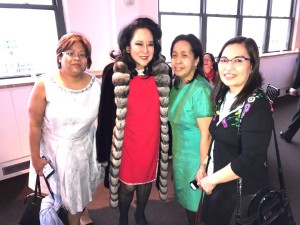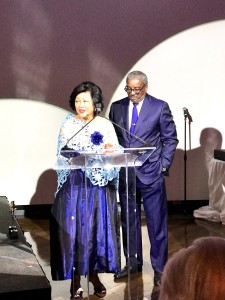Ma-Yi Theatre Co. honors prima ballerina, painter in New York

Honoree Elizabeth Roxas-Dobrish (third from left) with guests at Ma-Yi’s 28th anniversary gala. INQUIRER/Elton Lugay
NEW YORK— Ma-Yi Theatre Company, a leading incubator of new work exploring the Asian American identity, honored two Filipinas at a benefit gala April 24.
Held at TriBeCa 360, the event coincided with the theater company’s 28th founding anniversary. VIPs in the arts and theater community came out in full force, partly to recognize Jorge Ortoll, who has stepped down as Ma-Yi Theatre’s executive director after 27 years.
Artistic director Ralph Peña paid tribute to Ortoll “whose commitment to Ma-Yi Theatre is a source of inspiration to many of us, and fuels our work as we look forward to the next 28 years.”
Artists honored
The event’s Filipina honorees were Elizabeth Roxas Dobrish, the legendary prima ballerina of Ballet Philippines and Alvin Ailey Dance Company, and artist Lolita Valderrama Savage. Frank Savage was honored alongside his wife for their strong support of the arts and cultural and community development.

Gala hosts Broadway actor Paolo Montalban and transgender activist/model Geena Rocero. INQUIRER/Elton Lugay
“Stage has always been my platform. It’s a place for me to fully express myself, it’s a portal to my soul. I was able to reveal my true self, to reveal to my audience my true feelings, emotions and passion—which is to dance,” Roxas said in her speech.
Prima ballerina
Born in Manila, the legendary prima ballerina joined Ballet Philippines when she was 14 years old. She danced with the Metropolitan Opera Ballet, Ohad Naharin and Joyce Trisler Dance Company before becoming the first Filipina to join Alvin Ailey American Dance Theater.

After 27 years, Jorge Ortoll steps down as executive director of the Ma-Yi theatre company. INQUIRER/Elton Lugay
A principal dancer at Alvin Ailey American Dance Theater from 1984 to 1997, Dobrish promotes the African American choreographer and activist’s legacy by getting involved in the restaging of his works. She teaches at the Ailey School.
“It’s my desire to reach out and touch the audience through my artistry. It’s my full desire to be able to say I’m not going to say anything. If I can just stand there and present myself and fully do what I do best, which is dance,” Roxas told the audience at TriBeCa 360.
Using a different form of artistry, Lolita Savage similarly built a life around her passion.
Painter
“When I was a young girl, my father was horrified when I told him that I am going to pursue my painting career. He said, ‘What? Are you crazy? You will be poor all your life. Where will you get money to buy your food? That time, I did not think much about food. I really just needed money to buy paper and my pencil to be able to draw,” the internationally recognized artist said in her speech.
Lolita Savage has exhibited her artwork across Europe, Asia and the U.S. Also born in Manila, she earned her fine arts degree at the University of Santo Tomas before attending the Accademia di Belle Arti in Florence on a scholarship. In 2014, she was honored by then- President Benigno Aquino III for her distinct cultural and artistic accomplishments.

Ma-Yi artistic director Ralph Peńa (right) shares a breather with Paolo Montalban and “Hamilton” West End-bound actress Christine Allado INQUIRER/Elton Lugay
“My art took me all over the world. I had a great time. I had great exhibitions. I had successful exhibitions. And I even found a man who could give me food to eat for 37 years. Being an artist is not easy. Very few will ever become rich, yet art has an immense value that cannot be measured with money,” Lolita Savage said at the Ma-Yi Theatre gala.
International banker
Her husband, Frank Savage, is distinguished in international banking and investment management. He was the first African American to join Citibank’s international division in 1963 and has since held various executive positions, including chairman of Alliance Capital Management International. He is currently CEO of Savage Holdings.

International socialite Minnie Osmeńa (in red dress) with members of the media Ledy Almadin (from left), Cristina DC Pastor and Marivir Montebon. INQUIRER/Elton Lugay
Frank and Lolita Savage were honored at the Ma-Yi Theatre gala for their outstanding contribution to arts and education.
The event was emceed by transgender activist and model Geena Rocero and Broadway actor Paolo Montalban with special performances by Broadway Barkada, comedian Joel Kim Booster and vocalist Kea Chan.
An award-winning, nationally recognized nonprofit, Ma-Yi Theatre strives to address the cultural and artistic needs of Asian American communities and artists in the tri-state area.
It believes that theater can play an important part in breaking down barriers and increasing the understanding and appreciation of cultural and ethnic diversity.



